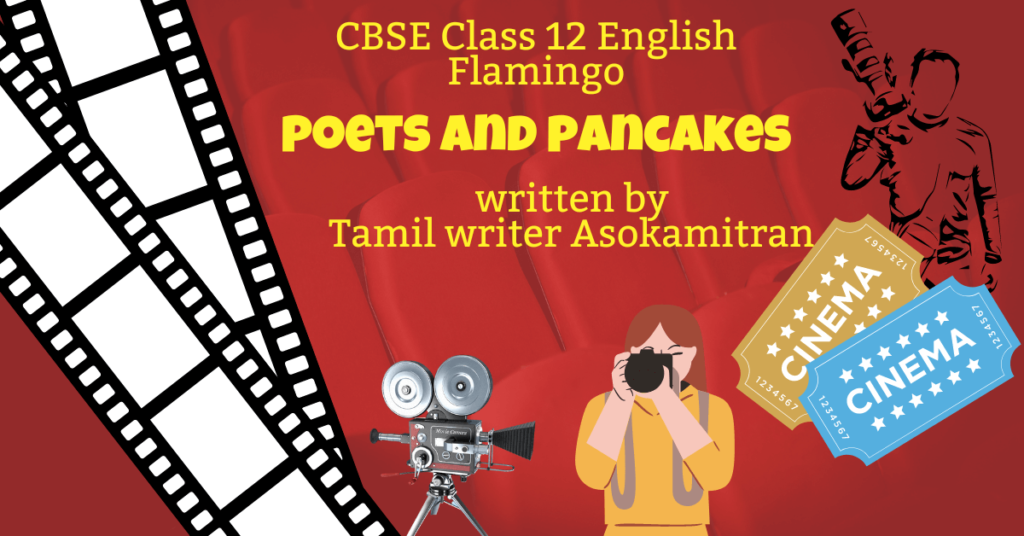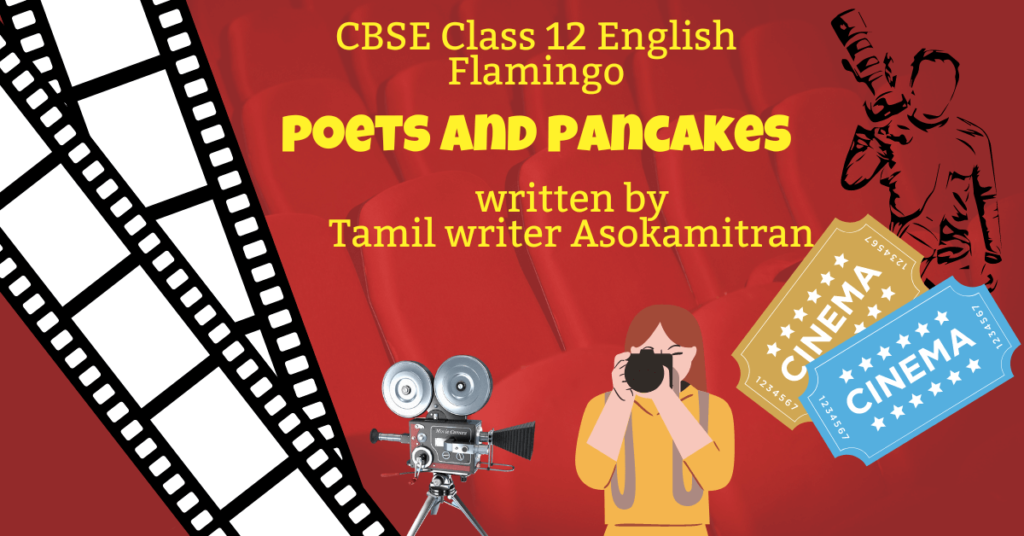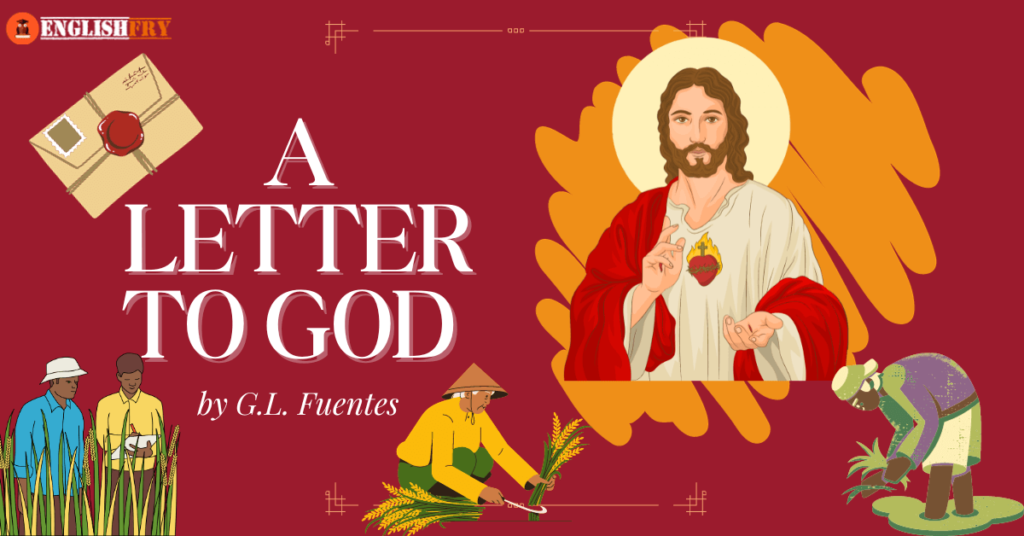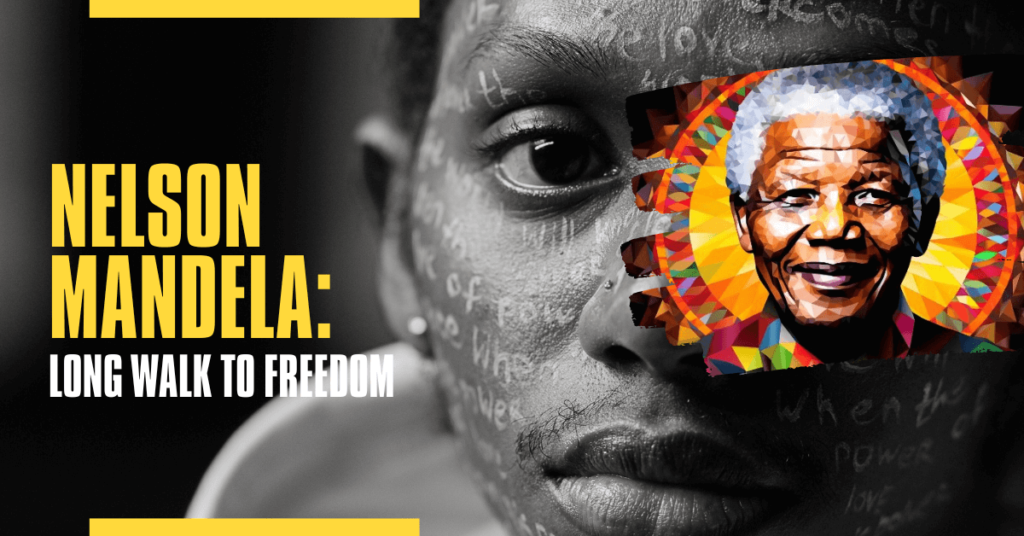Table of Contents
ToggleClass 12 english poets and pancakes summary
Asokamitran’s job at Gemini studio was one of the most unappreciated roles in the film industry. He spent his days cutting out newspaper clippings on various subjects and filing them away. Despite his crucial role in the studio’s research department, people often thought he wasn’t doing anything at all.
In fact, Asokamitran was the unsung hero of the studio. His meticulous research helped the writers and directors to come up with new and innovative ideas for their films. He was the one who found the obscure news articles that inspired some of the biggest blockbusters of the time.
But despite his importance, people often vented their frustrations and anger on him. Asokamitran was a patient man, and he listened to their rants with a smile on his face. He knew that they didn’t understand the value of his work, and he didn’t hold it against them.
One of the things that amused him most about working in the film industry was the makeup department. Gemini Studios bought pancake makeup in truckloads, which was used on many famous actors and actresses. Asokamitran found it funny that the department responsible for making people look beautiful was called the makeup department, yet they often made people look ugly.
There was a strict hierarchy in the makeup department, and everyone followed it. The head makeup artist was at the top, followed by the assistants, and then the junior makeup artists. Asokamitran found it fascinating that even in the makeup department, there was a pecking order.
But the person who fascinated Asokamitran the most was the office boy. The boy had big dreams of becoming an actor, writer, director, or lyricist. He was a bit of a poet too, and Asokamitran enjoyed listening to his poems.
Through the office boy, Asokamitran saw the plight of aspiring actors and writers. He saw the struggle of those who had big dreams but were stuck in a completely different job. It made him appreciate his own job even more, and he worked harder than ever to help the writers and directors bring their visions to life.
In the end, Asokamitran knew that his work was important, even if others didn’t understand it. He continued to cut out newspaper clippings and file them away, knowing that one day they would inspire the next big blockbuster. And he smiled, knowing that he was the unsung hero of the film industry.
The atmosphere at Gemini studio was always buzzing with creativity and imagination, and one person who added to this energy was a talented poet who often came up with alternative ideas for scenes in films. Despite his kind and gentle nature, he had managed to make a few enemies in the studio who were envious of his talent and popularity.
However, the studio had other important figures as well, such as the legal adviser who played a crucial role in managing the careers of the actors and actresses. It was said that he had once brought an end to an actress’s career due to a scandal that had tarnished her reputation.
In addition to the creative team, there was also a story department headed by a man named Subbu. He was known for his innovative and engaging plots that kept the audiences hooked to their seats.
The narrative then takes a political turn, as the author discusses the newly emerged ideology of communism in India. He writes that while the poets at Gemini studio admired Mahatma Gandhi and his ideas, they were not particularly fond of communism due to the negative impact it had on the Soviet Union.
However, it was not just the creative minds at the studio who were interested in politics. The Moral Re-Armament Army, a group aimed at spreading anti-communist sentiments, had also made their way to Gemini studios. They had recognized the significance and influence of the studio and had presented two plays there to promote their cause.
As the days passed, a new guest arrived at Gemini studio, someone who was unknown to all but was welcomed warmly by Mr. Vasan, the boss. This guest gave a rousing speech on the importance of freedom and democracy, leaving the audience inspired and motivated.
Overall, Gemini studio was a hub of creativity, talent, and diverse perspectives, making it an exciting and dynamic place to be.
One day, a young man was browsing through some books when he stumbled upon a British periodical called The Encounter. Intrigued by its contents, he decided to enter a writing competition that the magazine was hosting. However, before submitting his entry, he wanted to gather some more information about the publication and its editor.
So, he made his way to the British Council Library, hoping to find some copies of The Encounter. As he perused the shelves, he finally came across a few issues of the magazine. As he read through them, he was impressed by the quality of the writing and the diverse range of topics covered.
As he delved deeper, he discovered that the editor of The Encounter was none other than Stephen Spender – a name that he recognized from a recent visit to the Studio. In fact, he realized that Spender had been the unknown visitor who had come to speak with the artists about their work.
Excited by this connection, the young man began to research Spender’s life and career. He read about his early days as a poet and critic, his involvement in the Spanish Civil War, and his later work as a cultural ambassador for the British government.
As he pieced together this information, the young man felt a growing sense of admiration for Spender and his contributions to the literary world. And as he sat down to write his entry for The Encounter’s writing competition, he felt inspired by the legacy of this remarkable editor and writer.

Poets and Pancakes Summary in Hindi
जेमिनी स्टूडियो में असोकमित्रन का काम विभिन्न विषयों पर समाचार पत्रों की कतरनों को काटना और उन्हें फाइलों में संग्रहीत करना था। वह एक कक्ष में काम करता था और लोग आमतौर पर सोचते थे कि वह कुछ नहीं कर रहा है और उस पर व्याख्यान देकर अपनी कुंठा और गुस्सा उस पर निकालते थे। वह मेकअप सामग्री के बारे में बताते हुए शुरुआत करते हैं जिसे जेमिनी स्टूडियो ने पैनकेक नामक ट्रक में भरकर खरीदा था। जिसका उपयोग कई प्रसिद्ध अभिनेताओं और अभिनेत्रियों पर किया गया है। फिर मजाकिया अंदाज में उन्होंने मेकअप विभाग की आलोचना करना शुरू कर दिया, जो लोगों को बदसूरत दिखाने के लिए जिम्मेदार है और मेकअप विभाग में एक हड़ताल पदानुक्रम का पालन किया जाता था, जिसके अनुसार हर कोई काम करता था। फिर एक ऑफिस बॉय था जो अभिनेता, लेखक, निर्देशक या गीतकार बनना चाहता था और थोड़ा कवि भी था। ऑफिस बॉय के माध्यम से, वह महत्वाकांक्षी या संघर्षरत अभिनेताओं की दुर्दशा दिखाने की कोशिश करते हैं जो पूरी तरह से अलग काम करते हैं। वह जिस मुख्य किरदार के बारे में बात करते हैं, वह कोठामंगलम सुब्बू है, जो जन्म से ब्राह्मण होने के साथ-साथ कई अन्य गुण भी रखता है जैसे कि वह फिल्मों के लिए तैयार किया गया था और उसके साथ फिल्म बनाना आसान होगा। वह एक कवि भी थे और एक दृश्य को अभिनीत करने के लिए उनके पास कई विकल्प होते थे। उनके अच्छे स्वभाव के बावजूद स्टूडियो में उनके कई दुश्मन थे जो उनसे ईर्ष्या करते थे। फिर वह कानूनी सलाहकार के पास जाता है और बताता है कि कैसे वह एक अभिनेत्री के अभिनय करियर को खत्म करने के लिए जिम्मेदार था। स्टूडियो में एक कहानी विभाग भी था जिसका बॉस सुब्बू था। फिर कथा एक राजनीतिक बदलाव लेती है जहां साम्यवाद जो भारत में लोगों के लिए एक नई उभरी हुई विचारधारा थी, पर चर्चा की जाती है। वह लिखते हैं कि कवि गांधीजी से प्रेम करते थे लेकिन उनके विचारों के प्रति झुकाव रखते थे और साम्यवाद के प्रति भी उनमें गहरी नापसंदगी थी क्योंकि उसने सोवियत संघ के साथ जो किया। जेमिनी स्टूडियो में मोरल री-आर्ममेंट आर्मी के आगमन का उद्देश्य स्टूडियो में दो नाटक प्रस्तुत करके दक्षिण भारत में कम्युनिस्ट विरोधी भावनाओं को फैलाना था क्योंकि वे स्टूडियो के महत्व, प्रभाव और पहुंच को जानते थे। कुछ समय बाद जेमिनी स्टूडियो में एक और मेहमान आया, जिसके बारे में सभी को पता नहीं था और मिस्टर वासन (बॉस) ने उसका स्वागत किया। उन्होंने आजादी और लोकतंत्र पर लंबा भाषण दिया. कुछ दिनों के बाद, अशोकमित्रन ने द एनकाउंटर नामक एक ब्रिटिश पत्रिका देखी और वह अपनी प्रविष्टि भेजना चाहते थे और पहले से कुछ जानकारी चाहते थे और इसलिए उन्होंने ब्रिटिश काउंसिल लाइब्रेरी का दौरा किया। वहां उन्हें द एनकाउंटर की प्रतियां मिलीं और पता चला कि इसके संपादक स्टूडियो में अज्ञात आगंतुक स्टीफन स्पेंडर थे।

Poets and Pancakes Summary in Assamese
মিথুন ষ্টুডিঅ’ত অশোকমিত্ৰনৰ কাম আছিল বিভিন্ন বিষয়ৰ বাতৰি কাকতৰ টুকুৰাবোৰ কাটি ফাইলত সংৰক্ষণ কৰা। তেওঁ এটা কুবিকলত কাম কৰিছিল আৰু মানুহে সাধাৰণতে ভাবিছিল যে তেওঁ একো কৰা নাই আৰু তেওঁৰ ওপৰত নিজৰ হতাশা আৰু খং উলিয়াই তেওঁক বক্তৃতা দিছিল। তেওঁ আৰম্ভণিতে কয় যে মিথুন ষ্টুডিঅ’বোৰে ট্ৰাক ভৰ্তি কৰি কিনা মেক -আপ মেটেৰিয়েলৰ বিষয়ে কয় যাৰ নাম পেনকেক।যিটো বহু বিখ্যাত অভিনেতা আৰু অভিনেত্ৰীৰ ওপৰত ব্যৱহাৰ কৰা হৈছে। তাৰ পিছত হাস্যৰসময়ীভাৱে তেওঁ মানুহক কুৎসিত কৰি তোলাৰ দায়িত্বত থকা মেকআপ বিভাগটোক সমালোচনা কৰিবলৈ আৰম্ভ কৰে, আৰু মেকআপ বিভাগত এটা ষ্ট্ৰাইক হাইৰাৰ্কি আছিল যিটো অনুসৰণ কৰা হৈছিল, সেই অনুসৰি সকলোৱে কাম কৰিছিল। তাৰ পিছত এজন অফিচৰ ল’ৰা আছিল যিয়ে অভিনেতা, লেখক, পৰিচালক বা গীতিকাৰ হ’ব বিচাৰিছিল আৰু অলপ কবিও আছিল। অফিচৰ ল’ৰাটোৰ জৰিয়তে তেওঁ উচ্চাকাংক্ষী বা সংগ্ৰামী অভিনেতাৰ দুৰ্দশা দেখুৱাবলৈ চেষ্টা কৰে যিসকলে শেষত সম্পূৰ্ণ বেলেগ কাম কৰে। তেওঁ যিটো মূল চৰিত্ৰৰ কথা কয় সেয়া হৈছে কোথামাংলাম চুববু যিজনৰ গুণগতভাৱে ব্ৰাহ্মণ হোৱাৰ লগতে আন বহুতো গুণো আছে যেনে তেওঁ ছবি আৰু চলচ্চিত্ৰৰ বাবে টেইলাৰ মেইড আছিল – তেওঁৰ ওচৰত নিৰ্মাণ কৰাটো নিশ্চয় সহজ। তেওঁও কবি আছিল আৰু এটা দৃশ্য অভিনয় কৰিবলৈ বহু বিকল্প লৈ ওলাই আহিছিল। তেওঁৰ ভাল স্বভাৱৰ মাজতো ষ্টুডিঅ’ত তেওঁৰ বহু শত্ৰু আছিল যিয়ে তেওঁক ঈৰ্ষা কৰিছিল। তাৰ পিছত তেওঁ আইনী উপদেষ্টাৰ ওচৰলৈ স্থানান্তৰিত হয় আৰু এগৰাকী অভিনেত্ৰীৰ অভিনয় কেৰিয়াৰৰ অন্ত পেলোৱাৰ দায়িত্ব তেওঁ কেনেকৈ আছিল। ষ্টুডিঅ’টোতো এটা গল্প বিভাগ আছিল যাৰ বছ আছিল চুবু। তাৰ পিছত আখ্যানে ৰাজনৈতিক পৰিৱৰ্তন লয় য’ত ভাৰতত জনসাধাৰণৰ বাবে নতুনকৈ উত্থাপিত মতাদৰ্শ আছিল সাম্যবাদৰ বিষয়ে আলোচনা কৰা হয়। তেওঁ লিখিছে যে কবিসকলে গান্ধীজীক ভাল পাইছিল যদিও তেওঁৰ ধাৰণাসমূহৰ প্ৰতি প্ৰৱণতা আছিল আৰু তেওঁলোকৰো সাম্যবাদৰ প্ৰতিও প্ৰবল অপছন্দ আছিল কাৰণ ই ছোভিয়েট ইউনিয়নৰ ওপৰত যি কৰিলে। মিথুন ষ্টুডিঅ’ত নৈতিক পুনৰ অস্ত্ৰ-শস্ত্ৰ সেনাবাহিনীৰ আগমনৰ লগে লগে ষ্টুডিঅ’ৰ তাৎপৰ্য, প্ৰভাৱ আৰু প্ৰসাৰক তেওঁলোকে জানিছিল বাবে দুখন নাটক ষ্টুডিঅ’ত উপস্থাপন কৰি দক্ষিণ ভাৰতত কমিউনিষ্ট বিৰোধী অনুভূতি বিয়পাই দিয়াৰ পদক্ষেপ লোৱা হৈছিল। কিছু সময়ৰ পাছত আন এজন অতিথি মিথুন ষ্টুডিঅ’লৈ গৈছে যিজন সকলোৰে অচিনাকি আছিল আৰু মিষ্টাৰ ভাছানে (বছ) আদৰণি জনাইছে। স্বাধীনতা আৰু গণতন্ত্ৰৰ ওপৰত দীঘলীয়া ভাষণ প্ৰদান কৰে। কিছুদিনৰ পিছত অশোকমিত্ৰনে দ্য এনকাউণ্টাৰ নামৰ ব্ৰিটিছ সাময়িকী এখন দেখিলে আৰু তেওঁ নিজৰ প্ৰৱেশ পঠিয়াব বিচাৰিলে আৰু আগতীয়াকৈ কিছু তথ্য ল’ব বিচাৰিলে আৰু সেয়েহে তেওঁ ব্ৰিটিছ কাউন্সিল লাইব্ৰেৰীলৈ গ’ল। তাত তেওঁ দ্য এনকাউণ্টাৰৰ কপিবোৰ বিচাৰি পালে আৰু গম পালে যে ইয়াৰ সম্পাদক ষ্টুডিঅ’টোৰ অজ্ঞাত দৰ্শনাৰ্থী ষ্টিফেন স্পেণ্ডাৰ।

Gists of the Chapter
Chapter Sketch ‘Poets and Pancakes’ is a humorous and interesting account of Asokamitran’s experiences at Gemini Studios in Madras. It has interesting descriptions of personalities in a film company in the early days of Indian cinema. He vividly brings out some of the eccentricities and weaknesses of the characters in a delightful manner. The present chapter is an excerpt from his book ‘My Years with Boss’.
About the Characters Boss He is Mr SS Vasan, the founder of Gemini Studios. He had a liking for erudite and scholarly persons. He seems to be a gullible man who is surrounded by shallow people and sycophants. Subbu He is the no 2 at Gemini Studios. He always looked cheerful and was highly resourceful, charitable and of a loving nature. He was also an amazing actor, poet and novelist.
He was always seen with the Boss. Legal Adviser He was a lawyer working in the Story Department of Gemini Studios. He unintentionally ended the career of a budding actress. Office Boy He is in the make-up Department of Gemini Studios and does the make up the players in the crowd scenes of films. He aspired to be a top film star, screen writer, director or lyric writer, but was a highly frustrated man because he could not become any of them.
The Make-up Department of Gemini Studios
The make-up department was in a building which was said to be Robert Clive’s erstwhile stable. In the studios, the make-up material with the brand name ‘Pancake’ was used profusely. All actresses of yesteryears were familiar with it. The author feels that modern actresses may not be aware of its existence. The author mocks Robert Clive by saying that during his short life he is said to have lived in a number of residences in Madras. He fought battles and even got married here.
A Vivid Description of the Make-up room
The make-up room looked like a hair-cutting salon. It was crowded with large mirrors and flooded with light. It was not a very pleasing experience to get the make-up done because of the heat from the dazzling lights.
The Make-up Department and National Integration
The department was initially headed by a Bengali. He was succeeded by a Maharashtrian who was assisted by a Dharwar kannadiga. Then different people belonging to different states occupied the position there. The author points out that all this shows that the make-up department was an ideal specimen of national integration. The author jokingly tells the readers about the ‘skills’ of these make-up men. With quite a lot of Pancake and other potions and lotions, they could mar the beauty of any person. However, Asokamitran clarifies by saying that perhaps the hideous crimson coloured make-up was important to look presentable on the screen.
A Strict Hierarchy in the Make-up Department
An elaborate division of work marked the make-up department. The chief make-up man dressed up the actors in lead roles. His senior assistant looked after the `second’ hero and heroine while the junior assistant took charge of the main comedian. The players who played the crowd were looked after by the office boy of the department.
The Office Boy
The office boy was not exactly a boy. He was in his early forties. He joined the studio years back and aspired to be a top film star or top screen writer, director or lyric writer. He also wrote poetry. On the days of crowd-shooting, he mixed the make-up material on a large scale and painted faces.
The Narrator’s Work in the Studio
The narrator worked in a cubicle. His work was to cut newspaper clippings and store them in files. Everybody thought that his work was next to nothing and so he was continuously lectured by other employees. The office boy often came to his cubicle and gave vent to his feelings of frustration and irritation. The narrator desperately wished to escape from his continuous tirade and prayed for crowd shooting.
Kothamanglam Subbu
He was the No. 2 at Gemini Studios. According to the office boy, Subbu did not deserve anything because he was neither well educated nor had any exceptional talent. His only virtue was being a Brahmin, due to which he got opportunities readily. He was always cheerful. Even a flop film in which he had a hand couldn’t take away his cheerfulness. The narrator takes a dig at him by saying that he always needed people to work for him. He was ever-loyal to the Chief. Subbu could offer countless solutions to the problems of the producer of a film. The narrator comments that film making was quite simple with a man like Subbu around.
Subbu: the Poet
Although he was capable of writing on intricate topics, he wrote poetry for the masses. His success in films overshadowed his literary genius. He composed ‘story poems’ in folk refrain and diction. He recreated the mood and manner of the Devadasis of the early 20th century.
Subbu: the Actor and the Sycophant
The narrator mocks Subbu by saying that he was an amazing actor. Although he played minor roles, he performed them better than the lead actors. He always • said nice things about everything and everyone. His house was crowded with acquaintances and relatives who stayed there permanently. He was really close and intimate with the Boss and so had many enemies.
The Lawyer in the Story Department of Gemini Studios
The Story Department comprised of a lawyer and a group of writers and poets besides Subbu. The lawyer was the legal adviser but everybody referred to him as the illegal adviser! He had unintentionally brought about a sad end to the career of a budding talented actress by recording her outburst against the producer. The legal adviser looked different from the other members of his department as he wore pants and tie while they wore khadi dhotis and white khadi shirts. He was close to the Boss and was allowed to produce a film which flopped. The lawyer lost his job when the Boss closed the Story Department.
Gemini Studios : The Favorite Haunt of Intelligentsia
Gemini Studios was a hot favorite among the poets of that time. It has an excellent mess which supplied good coffee almost round the clock. Those were the days when the Congress government had implemented prohibition and people enjoyed their leisure time over a cup of coffee. Almost everybody seemed to have ample leisure time at the studio.
The Political Ideology at the Studio
Most of the people at the studio wore khadi and greatly appreciated Gandhiji. All of them were opposed to Communism and had many misconceptions about it. They thought Communists to be violent with no filial or conjugal feelings.
Studio Hosts Frank Buchman’s MRA (Moral Re-armament Army)
The M RA, a counter-movement to international Communism, visited Madras in 1952. It comprised of 200 people. The narrator had information that the big bosses of Madras played into their hands. The group was criticised by calling it an international circus. The MRA presented two plays, lotham Valley’ and ‘The Forgotten Factor’. Their sets and costumes were wonderful. The Gemini family comprising of six hundred members saw the plays repeatedly. The Tamil and Madras drama community were really impressed by them. The sunrise and sunset scenes of lotham Valley’ were reproduced in almost all Tamil plays in a similar fashion as that play. The narrator feels that hosting the group was a welcome change from their monotonous routine at the studio.
Another Visitor at Gemini Studios
Another visitor was soon going to visit the Gemini Studios. The staff did not have the faintest idea about him. He was rumoured to be a poet or editor. The visitor was not connected with any of the famous British publications. However, the guest arrived and the Boss read out a very long speech that did not have much to say about the visitor. When the guest’s turn came to address the audience, his accent could not be understood by anybody. His visit remained an “unexplained mystery.”
A Short Story Contest Organised by ‘The Encounter’
The narrator wanted to have an idea about the periodical’s credentials before participating in the contest and spending on the postage. He checked at the British Council Library and found out that the editor’s name was Stephen Spender. He recalled that this was the same editor who was a guest at the Gemini Studios. The writer felt that he had discovered a long lost brother and immediately sent his entry excitedly.
The Narrator Buys a Low-Priced book ‘The God That Failed’
Some years after leaving his job at the Gemini Studios. the narrator bought a low-priced copy of a book The God That Failed’ released on the 50th anniversary of the Russian Revolution. It was a compilation of six essays by six different authors on their journey into Communism and their disappointed return. Stephen Spender was one of the contributors. The narrator instantly recalled Stephen Spender’s visit to the Gemini Studios. Thus, the mystery was finally solved.

Add Your Heading Text Here
1. What does the writer mean by ‘the fiery misery’ of those subjected to make-up’?
The incandescent bulbs used in the make-up room produced a lot of heat and caused a lot of discomfort to the artists while in the make-up room. Every actor had to undergo some sort of make-up before shooting and suffered the heat of the bulbs in the room. This misery has been referred to as fiery in the lesson.
2.What is the example of national integration the author refers to?
The make-up division of the Gemini Studios was an example of national integration. According to the author, this is because people from different regions and religious groups worked together in the same department. The department was headed by a Bengali who was succeeded by a Maharashtrian. The other helpers included a Dharwar Kannadiga, an Andhra, a Madras Indian Christian, an Anglo-Burmese and the local Tamils.
3.What work did the ‘office boy’ do in the Gemini Studios? Why did he join the studios? Why was he disappointed?
The office boy applies makeup on the lesser-known actors who usually play the role crowd. He would mix various potions and apply them to the group playing actors in the most unprofessional way. He had joined the studios hoping that he would become a star actor someday or hold a prominent position in the film industry. But he failed and remained a mere ‘office boy’ and this left him perpetually disappointed.
4.Why was the office boy frustrated? Who did he show his anger on?
The office boy was frustrated because despite getting a good opening, he remained only an office boy. He had had a good formal education and would write poetry also. But his great literary talent was being allowed to go to waste. He showed his anger at Kothamangalam Subbu, the No. 2 at Gemini Studios.
5.Who was the Boss of Gemini Studios? Mr. S.S Vasan was the Boss of Gemini Studios.
6.What caused the lack of communication between the Englishman and the people at Gemini Studios?
Most of the 600-odd people at Gemini Studios were Tamil speakers. The Englishman was addressing them in his own language. He had a peculiar accent. Hence, there was a lack of communication between the Englishman and the people who could not follow what he was saying.
7.Why is the Englishman’s visit referred to as unexplained mystery?
The Englishman’s visit to the Gemini Studios is referred to as an unexplained mystery because no one could decipher his identity, whether he was a poet or an editor. Besides, when he spoke, no one at the studio understood what he intended to say, as his accent was beyond their comprehension.
8.Who was the English visitor to the studios?
The English visitor to the Gemini Studios was Stephen Spender. He was the editor of The Encounter, a British Periodical, and a famous English poet, essayist and novelist of the twentieth century.
9.How did the author discover who the English visitor to the studios was?
Before investing money in participating in a short story contest organised by an English periodical, The Encounter, the author did research on the magazine. He went to the British Council Library where, while going through an issue of that periodical, he discovered that its editor was Stephen Spender, the poet who had once visited the studio.
10.What does ‘The God that Failed’ refer to?
‘The God That Failed’ was a compilation of six essays written by six eminent writers, namely, Andre Gide, Richard Wright, Ignazio Silone, Arthur Koestler, Louis Fischer and Stephen Spender. In each of the essays, the respective writers described “their journeys into Communism and their disillusioned return”.
11.Why was Kothamangalam Subbu considered No. 2 in Gemini Studios?
ANSWER :Kothamangalam Subbu succeeded in securing the place closest to The Boss by means of flattery. He was not brilliant but a rather cheerful person and exceedingly loyal to The Boss. He offered solutions whenever The Boss was in a fix. Thus, the other employees considered him No.2 in Gemini Studios.
12.How does the author describe the incongruity of an English poet addressing the audience at Gemini Studios?
ANSWER :The English poet was addressing the Tamil audience at Gemini Studios in English with a typical provincial accent. He was talking about the thrills and travails of an English poet to a dazed and silent audience. This was the incongruity because his audience could not understand him at all.
13.What do you understand about the author’s literary inclinations from the account?
ANSWER: The writer was a prose-writer. He wanted to send a short story for the short story contest organised by a British periodical by the name ‘The Encounter’.
Founder of Englishfry.com, a captivating and knowledge-driven blog & Founder of Android app/website Studyfunnel.com, an online Mock Test Series Portal. With a wealth of experience spanning over 16+ years, he has excelled as an Ex-Asst.Professor, Teacher, Amazon published author, Website Developer, Graphic Designer,Blogger,Poet, and Creative academic content writer publisher of 4 academic books available Online on Amazon & Flipkart. His tryst in Literature helped him realize his love for writing and telling stories. A tech-savvy language nerd by day and, a passionate writer by night, he now translates his experiences into tales of wisdom served with a side of humor.His widely recognized profound insights ,captivating writing style of weaving words make him contribute to prestigious publications and a sought-after authority in the field that transport readers to extraordinary worlds.








